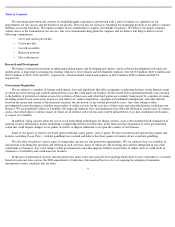Zynga 2013 Annual Report Download - page 18
Download and view the complete annual report
Please find page 18 of the 2013 Zynga annual report below. You can navigate through the pages in the report by either clicking on the pages listed below, or by using the keyword search tool below to find specific information within the annual report.
Table of Contents
These and other uncertainties make it difficult to know whether we will succeed in continuing to develop successful mobile games. If we
do not succeed in doing so, our business will suffer.
If our top games do not maintain their popularity, our results of operations could be harmed.
In addition to creating new games that are attractive to a significant number of players, we must extend the life of our existing games, in
particular our most successful games. Traditionally, bookings from existing games decline over time. For example, in 2013, bookings declined
38% from 2012. For a game to remain popular, we must constantly enhance, expand or upgrade the game with new features that players find
attractive. Such constant enhancement requires the investment of significant resources, particularly with older games, and such costs on average
have increased. We may not be able to successfully enhance, expand or upgrade our current games. Any reduction in the number of players of
our most popular games, any decrease in the popularity of our games or social games in general, any breach of game-related security or
prolonged server interruption, any loss of rights to any intellectual property underlying such games, or any other adverse developments relating
to our most popular games, could harm our results of operations.
A small number of games have generated a majority of our revenue, and we must continue to launch, innovate and enhance games that
players like and attract and retain a significant number of players in order to grow our revenue and sustain our competitive position.
Historically, we have depended on a small number of games for a majority of our revenue and we expect that this dependency will
continue for the foreseeable future. Bookings and revenue from many of our games tend to decline over time after reaching a peak of popularity
and player usage. We often refer to the speed of this decline as the decay rate of a game. As a result of this natural decline in the life cycle of our
games, our business depends on our ability to consistently and timely launch new games across multiple platforms and devices that achieve
significant popularity and have the potential to become franchise games. For example, we recently announced that we will launch a mobile
version of Farmville 2 in the second quarter of 2014, however there is a risk that we may not launch the game according to schedule, or that the
game does not attract and retain a significant number of players, which would lead to a negative effect on our business.
Each of our games requires significant engineering, marketing and other resources to develop, launch and sustain via regular upgrades and
expansions, and such costs on average have increased over the last several years. Our ability to successfully launch, sustain and expand games
and attract and retain players largely will depend on our ability to:
14
•
execute our network strategy and expand our network to mobile;
•
anticipate and effectively respond to the growing number of players switching from web-
based to mobile games, the changing mobile
landscape and the interests of players on mobile platforms;
•
attract, retain and motivate talented game designers, product managers and engineers who have experience developing games for
mobile platforms;
•
minimize launch delays and cost overruns on the development of new games;
•
effectively monetize mobile games without degrading the social game experience for our players;
•
develop games that provide for a compelling and optimal user experience through existing and developing third party technologies,
including third party software and middleware utilized by our players; and
•
acquire and successfully integrate high quality mobile game assets, personnel or companies.
•
anticipate and effectively respond to changing game player interests and preferences;
•
anticipate or respond to changes in the competitive landscape;
























